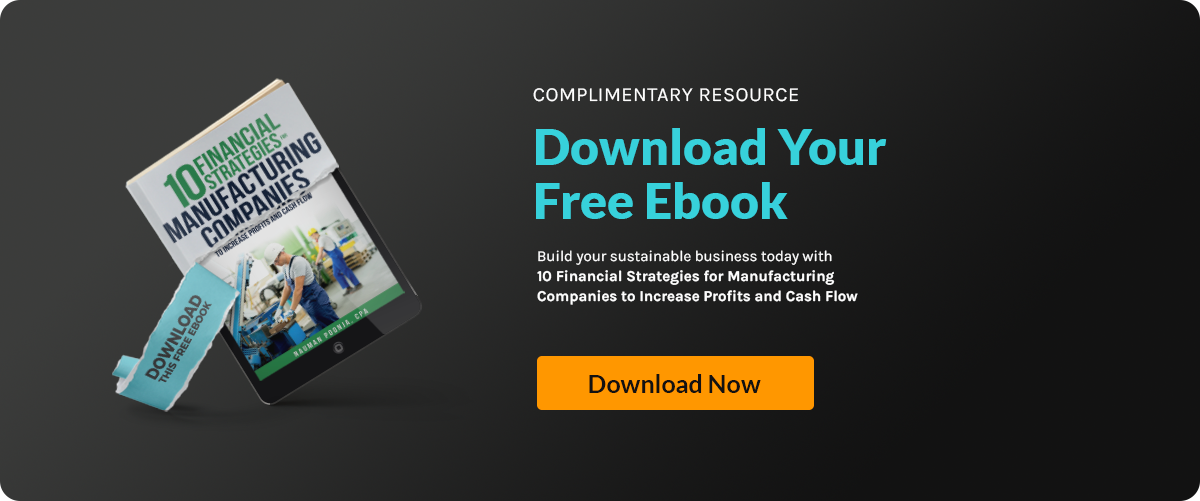A 13-week cash flow forecast is crucial for manufacturing businesses to plan and manage their cash...
10 Accounting Best Practices for Manufacturing Business Success
In the manufacturing sector, where processes are as complex as the machinery, a minor misstep in accounting can cause significant disruptions.
What happens when the rhythm is off? When consistency falters, it can lead to many issues, leaving businesses struggling to find their footing in a competitive market.
Questions like "Are we pricing our products correctly?" or "How can we reduce production costs without compromising quality?" are common pain points that keep manufacturing industry leaders up at night. In fact, 82% of small businesses fail due to poor cash flow management, making it crucial for manufacturers to maintain strong financial oversight and strategic planning.
With the latest trends in accounting, including automation and real-time data analysis, manufacturers can streamline operations, enhance decision-making, and ultimately, pave the way for growth and innovation.
This guide will help you explore how adopting best practices can transform challenges into opportunities for manufacturing triumph.
Read below and discover the blueprint for success in the manufacturing world.
Understanding the Role of a CPA Firm in Financial Management
A Certified Public Accountant (CPA) firm plays a pivotal role in managing a company's finances. If you're starting a business, you have the option to choose between cash basis or accrual accounting. Accrual accounting aligns with Generally Accepted Accounting Principles (GAAP), offering a structured framework, whereas cash basis might be more tax-efficient. It's beneficial to consult with a CPA firm to determine the best approach for your financial records.
Key Functions of a CPA Firm:
- Financial Reporting: CPA firms are essential for preparing comprehensive business tax returns. As your business grows, it can provide services like external audits or financial statement reviews, ensuring that your financial documents comply with necessary regulations and standards.
- Audit and Assurance Services: In conducting audits, CPA firms delve into your accounting records. They carry out tests such as sampling, balance confirmations, and recalculations to ensure the accuracy and integrity of financial statements. These audits enable stakeholders to trust the company's financial health.
- Tax Strategy and Compliance: Beyond mere tax preparation, CPAs offer strategic advice to optimize tax liabilities. They help businesses navigate complexities in tax law, ensuring compliance while identifying potential savings and benefits.
- Advisory Services: A CPA firm provides valuable insights and guidance on financial strategies, fostering growth and sustainability. They assist in budgeting, forecasting, and financial planning, empowering businesses to make informed decisions.
In summary, CPA firms are not just number crunchers. They are strategic partners that enhance a company’s financial robustness and compliance, supporting long-term success through meticulous financial management and expert advice.
10 Accounting Best Practices for Manufacturing Businesses to Follow
Start achieving financial excellence with these 10 accounting best practices that every manufacturing business should follow for streamlined success.
1. Implement an Integrated Accounting System
Integrated accounting systems consolidate business processes and improve information flow, reducing operational costs.
A study by AccountsIQ highlights that integrated systems can transform finance functions, offering real-time data and reducing manual data entry through automation.
It would be best to start by evaluating your current systems and identifying key integration points for a seamless flow of information across departments.
2. Adopt Lean Accounting Methods
Lean accounting focuses on value creation and eliminating waste aligns with lean manufacturing principles, aiming to reduce lead times and inventory levels, thus freeing up capacity and reducing costs. Start by mapping all value streams and applying 'box score' reports to determine operational and financial results.
3. Regular Financial Health Check-ups
Regular examination of accounting records can avert potential setbacks by detecting issues promptly.
A guide by The Fabricator emphasizes the importance of knowing your suppliers' economic stability, especially during economic downturns like the COVID-19 pandemic.
Establish a routine for systematic reviews of your accounting documents and employ methods like ratio analysis to evaluate economic robustness.
4. Embrace Automated Accounting
Automation in financial management minimizes routine tasks and boosts operational efficiency. According to PwC, such technological integration enables professionals to concentrate on services that add significant value.
Pro Tip? Pinpoint routine activities within your financial workflows that can be streamlined through automation to conserve time and enhance precision.
5. Stay Updated with Regulatory Changes
Regulatory changes can have significant impacts on manufacturing businesses. Keeping up with these changes is essential for compliance and avoiding penalties. Subscribe to regulatory update newsletters and attend webinars to stay informed on the latest changes.
6. Standardize Accounting and Bookkeeping Systems
Standardized procedures ensure consistency and reliability in reporting. It would be to your advantage if you develop a comprehensive accounting manual that outlines all procedures and ensure all team members are trained on it.
7. Conduct Regular Audits
Regular audits verify the accuracy of records and enhance stakeholder trust. They can also identify areas for improvement and mitigate risks. Wise manufacturing business owners plan for internal and external audits and use the findings to improve accounting practices.
8. Optimize Inventory Management
Just-in-time (JIT) inventory practices align production with demand, reducing holding costs and improving cash flow. Working closely with suppliers to ensure timely delivery of materials and adopt a JIT inventory management system would be the best strategy to optimize your inventory management. 9. Enhance Cost Tracking
Job costing and overhead allocation accurately track production costs. This helps set competitive pricing and manage profitability.
To make things work for your manufacturing business, implement a job costing system that tracks direct labor and allocates overhead costs to jobs based on a predetermined rate.
9. Enhance Cost Tracking
Effective job costing and overhead allocation provide clear visibility into production expenses, helping manufacturers optimize pricing, budgeting, and profitability. Accurate cost tracking also identifies inefficiencies, reduces waste, and supports better financial forecasting, ensuring competitive and sustainable operations.
10. Invest in Training Your Accounting Team
Ongoing training for your team is vital to stay current with industry norms and compliance changes. It also enhances overall efficiency and employee output. The best strategy is to develop a detailed training program that includes a mix of in-house and external seminars, covering various topics related to managing and overseeing economic activities.
By implementing these strategies, you can boost your processes' operational effectiveness and performance, leading to better management of resources and more strategic decision-making.
Why Efficient Accounting Practices Matter for Business Growth
Efficient accounting practices are crucial for businesses aiming to secure bank loans, engage in mergers and acquisitions (M&A), or launch an initial public offering (IPO). Here's why:
1. Facilitating Financial Transparency
Accurate accounting ensures that your financial statements—like the income statement, balance sheet, and cash flow statement—are clear and transparent. This transparency is vital for building trust with banks, investors, and potential business partners. Correct and precise financial data can paint a reliable picture of your company’s financial health, which is crucial when seeking funding or partnerships.
2. Strengthening Internal Controls
Implementing strong internal controls as part of your accounting practices helps safeguard company assets and enhance the efficiency of operations. These controls can uncover discrepancies before they become problematic, ensuring your financial data remains reliable. This proactive approach is advantageous when you're preparing for the meticulous scrutiny of an IPO or a buyout situation.
3. Ensuring Compliance with Standards
Adhering to Generally Accepted Accounting Principles (GAAP) or International Financial Reporting Standards (IFRS) ensures that your accounting records are in line with regulatory requirements. Compliance not only aids in avoiding legal and financial penalties but also makes your business more appealing to lenders and investors who value adherence to standard practices.
4. Reducing Errors and Delays
Inadequate accounting systems can lead to errors that can cause costly delays, particularly during crucial financial events. Investing in efficient bookkeeping software and practices minimizes these risks. This is essential for smooth transactions during bank lending processes, M&A deals, or when preparing for an IPO.
5. Increasing Valuation
Your company's valuation largely depends on accurate financial reporting, especially during market assessments like an IPO or a buyout. Efficient accounting practices ensure high-quality financial data that help in maximizing your company's worth.
By embedding efficient accounting practices early on, businesses can position themselves favorably for growth opportunities while mitigating the risk of financial pitfalls.
How Can an Accountant Contribute to Business Success?
The role of an accountant is pivotal in steering the company towards success. An accountant does more than just crunch numbers; they are strategic partners who ensure the financial health of a business.
Here are the ways an accountant can be instrumental:
1. Implementing Robust Accounting Software
An accountant can automate financial transactions by introducing advanced accounting software like QuickBooks, making invoicing and payroll more efficient.
2. Maintaining Accurate Financial Records
Accountants help maintain accurate financial records, which are essential for analyzing business expenses and preparing balance sheets. This accuracy is crucial to avoid inaccurate reporting that can lead to legal consequences.
3. Enhancing Financial Analysis
Through meticulous financial analysis, accountants turn financial data into actionable insights, helping small business owners make informed decisions.
4. Managing Cash Flow
By keeping track of accounts receivable and bank statements, accountants ensure a steady cash flow, which is the lifeblood of any business.
5. Forecasting Financial Trends
Accountants use historical financial information to forecast future trends, aiding in informed business planning and strategy.
6. Ensuring Compliance
With a deep understanding of accrual accounting and internal controls, accountants help businesses adhere to regulations and avoid penalties.
7. Optimizing Tax Filing
Accountants play a critical role during tax filing season by identifying potential tax deductions and ensuring accurate filings, saving the business money.
8. Advising on Business Accounting
Financial experts offer guidance on optimal business practices for financial management, encompassing overseeing the ledger structure and making sense of fiscal responsibilities.
9. Developing Internal Controls
To safeguard assets and ensure the integrity of financial reports, accountants develop and implement internal controls within the accounting department.
10. Facilitating Decision Making
By providing accurate financial records and analysis, accountants help you make strategic decisions that can shape the future of your business.
An accountant is not just a number-cruncher but a guardian of a business's financial well-being. Their expertise in handling financial information and their ability to make informed recommendations can significantly contribute to the success of a small business.
Leveraging their financial transactions, payroll, and records management skills, they help businesses maintain financial stability and achieve long-term growth.
Streamline Your Operations with Efficient Financial Processes From Accounovation!
Clearly, your business's financial health is not just about numbers—it's about adopting effective accounting practices that every business, regardless of size, should follow.
Accounovation stands at the forefront of this mission, providing solutions in bookkeeping and accounting that cater to the unique needs of your business or organization.
Good accounting is the cornerstone of any successful enterprise, and with Accounovation, you're not just using accounting software; you're embracing a partnership that ensures accurate accounting records, compliance with legal and regulatory requirements, and the overall financial health of your company.
Why Partner With Accounovation For Your Accounting Needs?
Accounovation helps you understand the importance of maintaining robust policies and procedures, reducing the risk of fraud, and ensuring accurate financial statements. Our expertise in different accounting areas, such as accounting tasks and financial ratios, empowers you to make informed decisions based on relevant financial information.
Our accounting professionals are dedicated to maintaining accuracy and reducing the risk of errors in your financial documents. From finance and accounting duties to managing critical financial tasks, we offer a range of services including cloud-based accounting, financial forecasting, and preparation of cash flow statements.
We provide the key financial insights and accounting best practices your business needs to thrive. We aim to help your business achieve financial health by offering cloud-based accounting solutions that meet legal and regulatory requirements while ensuring critical financial data is always at your fingertips.
Embrace the change that Accounovation brings to your finance department. Let us help you make informed business decisions, safeguard your assets, and promote sustainable growth.
Contact Accounovation today, and take the first step towards streamlining your operations with efficient financial processes that will set your business apart.








